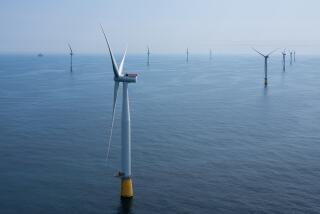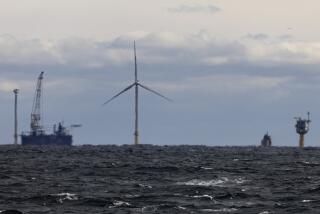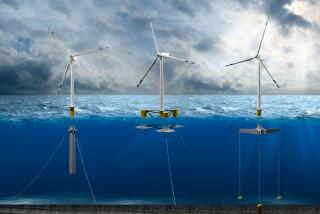Offshore wind-power project OKd
- Share via
WASHINGTON — In a decision that could boost development of wind power nationwide, Interior Secretary Ken Salazar on Wednesday approved a controversial offshore wind project off Cape Cod -- potentially the first coastal installation of its kind in the United States.
The decision to grant a federal permit to the Cape Wind project was a victory for green-power advocates over local opponents, most of whom are concerned about effects on scenery, fishing and -- in the case of some Native Americans -- intrusion into areas traditionally considered sacred.
Approval comes after nine years of government reviews, and is expected to encourage action on a host of similar projects along the Atlantic and Gulf coasts, as well as in the Great Lakes.
Salazar’s decision drew immediate praise from business groups, environmentalists and even some Republicans on Capitol Hill, but critics promised what is likely to be a drawn-out legal challenge.
Salazar, announcing his action in Boston, said he was “convinced there is a path we can take that both honors our responsibility to protect the historic, cultural and environmental values of Nantucket Sound and meets our need to repower our economy with clean energy produced here at home.”
He said the precedent-setting potential of the Cape Wind project weighed heavily in its favor, especially since President Obama has made offshore wind a pillar of his alternative-energy strategy.
Offshore wind proposals are under consideration in Delaware, Rhode Island and New Jersey, along with several Great Lakes states.
Wide-scale development along the Pacific Coast is likely farther off, because the technology required for the Pacific Ocean’s deeper waters would be more complicated and expensive.
Cape Wind would string 130 turbines in Massachusetts’ scenic Nantucket Sound in an area about five miles from shore.
They could supply the majority of the power on Cape Cod and nearby islands.
Opponents -- including some Cape Cod residents, newly elected Sen. Scott Brown (R-Mass.), members of the Kennedy clan and the Wampanoag Indians of southeastern Massachusetts -- say the turbines would mar cherished vistas and disrupt native spiritual ceremonies.
Buddy Vanderhoop, a prominent member of the Wampanoag Tribe of Gay Head (Aquinnah) on Martha’s Vineyard, greeted Salazar’s decision with anger and vowed to sue “until we win.”
“This is a direct slap in the face to all Native Americans,” he said.
Audra Parker, president of the Alliance to Protect Nantucket Sound, a coalition of opposition groups, said in an interview that “the fight is far from over. It ultimately will be settled in court based on fact, not politics.”
Salazar conditioned the permit on developers taking steps to minimize the wind farm’s visual impacts, including requiring the turbines to be painted a shade of off-white to better blend in with sea and sky.
Supporters of the decision emphasized the potential for offshore wind power, which Salazar has been touting since shortly after taking office; an Interior Department report last year estimated the Atlantic Coast alone could eventually supply a quarter of the nation’s electricity demand.
“America needs offshore wind power,” Massachusetts Gov. Deval Patrick, a Cape Wind supporter, said at the news conference with Salazar, “and with this project, Massachusetts will lead the nation.”
Cape Wind developers cheered when they heard the news, spokesman Mark Rodgers said.
“This has been such a long road for us -- almost a decade of hard work,” Rodgers said. “People feel intensely gratified.”
How much longer that road will be will probably be decided in court. Salazar promised a “a more rational and orderly process” for such proposals.
bob.drogin@latimes.com
More to Read
Sign up for Essential California
The most important California stories and recommendations in your inbox every morning.
You may occasionally receive promotional content from the Los Angeles Times.














